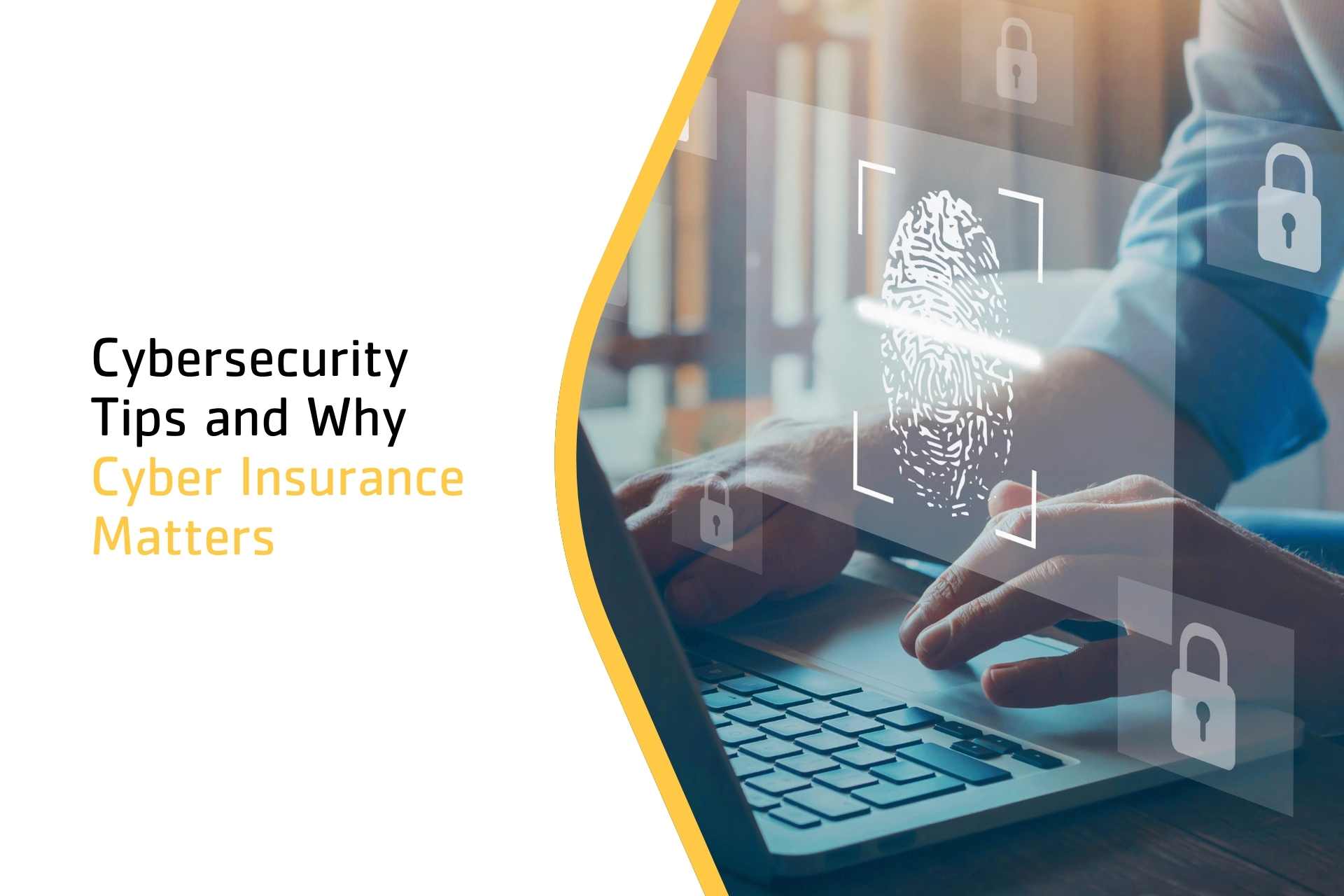In today’s digital age, businesses rely more than ever on technology to manage day-to-day operations, from accounting and payroll to customer data and communications. While these tools make business more efficient, they also open the door to potential cyber threats. Whether it’s ransomware, phishing scams, or data breaches, the consequences of a cyber attack can be severe, especially for small and medium-sized businesses.
With cybercrime on the rise, cyber insurance offers a critical layer of protection, covering the financial costs associated with recovery from an attack. But beyond insurance, there are simple steps businesses can take to reduce their risks and protect their data.
These measures don’t require heavy technical knowledge but can significantly reduce the likelihood of a cyber attack.
Table of Contents
Cybersecurity Essentials for Small Businesses
Cybersecurity isn’t just about expensive software—many preventative steps are straightforward and affordable. These practices can go a long way towards protecting your business from threats:
Strong Passwords and Two-Factor Authentication (2FA)
Encourage your team to use strong, unique passwords for each account and enable Two-Factor Authentication (2FA) wherever possible. This adds an extra layer of protection beyond just a password, requiring an additional code sent to a device or email.
Regular Data Backups
Back up important data regularly and store it securely, whether in the cloud or on external drives. This ensures that if an attack does happen, your business can recover quickly without losing crucial information.
Keep Software Up to Date
Cybercriminals often exploit vulnerabilities in outdated software. Keeping your systems and software up to date ensures you’re protected by the latest security patches.
Employee Training and Awareness
Many cyberattacks begin with human error, such as clicking on a malicious link or sharing sensitive information. Train your employees to spot phishing emails and other common cyber threats.
Use Firewalls and Anti-Virus Software
Firewalls help block unauthorised access to your network, while anti-virus software can detect and neutralise threats like malware or viruses. Make sure these are installed and updated.
Secure Wi-Fi Networks
Make sure your business’ Wi-Fi network is secure with a strong password and consider setting up a guest network for visitors. This prevents unauthorised access to your main business network, which may hold sensitive financial and client data.
Access Controls and Permissions
Limit access to sensitive data and systems based on each employee’s role. Use role-based permissions to ensure that only authorised staff can access critical information, reducing the risk of internal breaches or accidental exposure of data.
Encrypt Sensitive Data
Encrypt sensitive files and communications, especially when they are being transmitted over the internet. This ensures that even if data is intercepted, it cannot be easily read or used by cybercriminals.
Develop a Cybersecurity Policy
Create a clear, easy-to-understand cybersecurity policy that outlines best practices for handling sensitive data, accessing systems, and responding to potential threats. Ensure all employees are familiar with and adhere to the policy.
Plan for Incident Response
Despite the best preventative measures, incidents can still happen. Have a response plan in place to quickly detect, respond to and recover from a cyber attack. This should include steps to isolate affected systems, notify stakeholders, and restore data from backups to minimise disruption.
Cyber Awareness: Protecting Your Team and Business
One of the best defences against cyber threats is awareness. While software plays its part, your employees can be the key to either preventing or enabling a cyber attack. Introducing cyber awareness training is a smart way to ensure your team understands the risks and knows how to handle suspicious communications.
Practical tips for your team include:
- Being Cautious with Attachments and Links: Always check links before clicking and only open attachments from trusted sources. If an email looks suspicious, verify the sender directly.
- Recognising Phishing Attempts: Emails or messages that ask for personal or financial information should be treated with caution, especially if they come from an unfamiliar source or look slightly off.
- Verifying Requests: If someone requests sensitive data or asks you to process payments, always verify the request through another communication channel before acting.
- Securing Devices: Ensure all work devices have strong passwords, are regularly updated and are locked when not in use.
- Avoiding Public Wi-Fi for Work: Public Wi-Fi networks are often insecure, making it easy for attackers to intercept data. Encourage your team to avoid accessing work systems on public networks or use a VPN for a secure connection.
By making cyber awareness part of your business’ routine, you can minimise the risk of human error leading to a security breach.
Common Tax Scams and ATO Advice
Tax scams are a growing issue, especially during tax season when both businesses and individuals are more vulnerable. Cybercriminals often pose as the Australian Taxation Office (ATO) to trick people into sharing personal details, making payments, or handing over sensitive financial information.
Here are some common ATO-related tax scams to watch out for:
Common Tax Scams:
- Phishing Emails: Scammers send emails that appear to come from the ATO, requesting personal information or directing you to a fake ATO website. These emails often ask for your Tax File Number (TFN), bank details or passwords.
- Phone Scams: Scammers call, pretending to be ATO representatives and demand immediate payment for a supposed tax debt. They may threaten arrest or legal action if you don’t comply.
- Fake Tax Refunds: You receive a message (via email, text or call) saying you’re entitled to a tax refund and asking you to click on a link to provide banking details or other personal information.
- SMS Scams: Scammers send text messages with links to fake ATO websites, asking you to confirm your identity or claim a refund.
- Ransomware Scams: Some scams involve ransomware, where you receive a fake ATO email with a malicious attachment. When opened, the attachment can lock you out of your files and demand a ransom to regain access.
What the ATO Has Said They Will Never Do:
To help protect yourself from these scams, it’s important to understand what the ATO will never do. According to their official guidelines, the ATO will never:
- Demand immediate payment over the phone, through email or via text message, especially using unusual payment methods like prepaid gift cards, cryptocurrency or iTunes cards.
- Send unsolicited emails or texts asking for personal or financial information including your TFN or bank account details.
- Threaten you with arrest, jail or deportation if you don’t immediately comply with a demand for payment.
- Ask for personal details via social media platforms including Facebook, Twitter or other messaging apps.
- Provide links in emails or text messages directing you to a login page for online services.
By being aware of these common scams and knowing what the ATO will never do, you can better protect yourself and your business from tax-related fraud. If in doubt, always contact the ATO directly using official contact details to verify any communications.
Spotting Fake Communications from “Carbon Group” Imposters
Unfortunately, cybercriminals may go to great lengths to impersonate trusted businesses, including companies like Carbon Group. Scammers might pose as accountants or bookkeepers, asking for details they shouldn’t need, such as passwords or personal financial information.
Here are some signs to watch for:
Signs of a Scam: How to Spot Fake Carbon Group Communications
1. Unusual Requests for Personal Information
If you have provided personal information to your advisor at Carbon, you should not have to provide it again and if you receive any emails or requests asking for it, tread carefully.
Be cautious if you receive unexpected communication asking for personal or financial information, particularly if it claims to be urgent or needs immediate action.
2. Suspicious Email Addresses
Always check the sender’s email address carefully. Scammers often use email addresses that look similar but have minor differences, like “carbon.com” or “carbonbusinessgroup.com.au” instead of “carbongroup.com.au.”
If something feels off, compare the sender’s email to official Carbon Group contact details, and don’t hesitate to verify directly through known contact channels.
3. Pressure or Urgency
Scammers often create a sense of urgency, claiming immediate action is required or that there will be severe consequences if you don’t comply. Carbon Group will never pressure you into providing information or making payments under threat.
If an email or phone call pushes you to act quickly, take the time to verify the communication by calling Carbon Group’s official number or contacting your usual advisor directly.
4. Requests for Unusual Payment Methods
Carbon Group will not ask for payment via methods like gift cards, cryptocurrency or prepaid debit cards. If someone claiming to be from Carbon Group requests payment through these channels, it’s a red flag.
Always confirm payment requests through official channels if something doesn’t seem right.
5. Suspicious Links or Attachments
Be cautious about clicking on links or downloading attachments from unknown or unexpected emails. Scammers may use these to steal your personal information or install malware.
If you get an unanticipated email that appears to be from Carbon Group and contains a link or attachment, contact your Carbon Group advisor to confirm its legitimacy before proceeding.
6. Phone Scams
Be wary of phone calls from individuals claiming to be from Carbon Group, particularly if they ask for financial details or payment information over the phone.
If you’re unsure about the caller, hang up and contact Carbon Group using a verified phone number to check if the communication is legitimate.
By staying vigilant, you can help protect yourself from these types of scams.
How Cyber Insurance Can Provide Peace of Mind
Even with strong cybersecurity measures, no business is completely safe from cyber threats. This is where cyber insurance becomes essential. Hacking incidents, like unauthorised spending on Facebook ads, are becoming more frequent. In one recent case, a business spent $14,000 in unauthorised ad charges, with the potential for even more damage as their account was set to spend $50,000 per day. Fortunately, with a cyber insurance policy in place, they had the coverage to help manage the financial fallout and recover.
For small businesses, this kind of protection can mean the difference between a quick recovery and long-term damage to both finances and reputation. This highlights just how important it is to protect your business from similar threats. Cyber insurance can cover everything from data breaches and phishing scams to ransomware attacks. At Carbon Insurance Brokers, we help you find the right coverage for your business, ensuring you’re prepared for whatever comes your way.
How Carbon Can Help
At Carbon, we understand that running a business and the advancement in technology brings new challenges, especially when it comes to cybersecurity. Our team can support you with practical advice on keeping your financial data safe and ensuring your business is prepared for the unexpected. Whether it’s through cyber insurance solutions or our accounting and bookkeeping services, we can help you navigate the complexities of running a modern business while staying secure.
If you’re looking for expert guidance on protecting your business from cyber threats, feel free to reach out to us. We’re here to help.






















